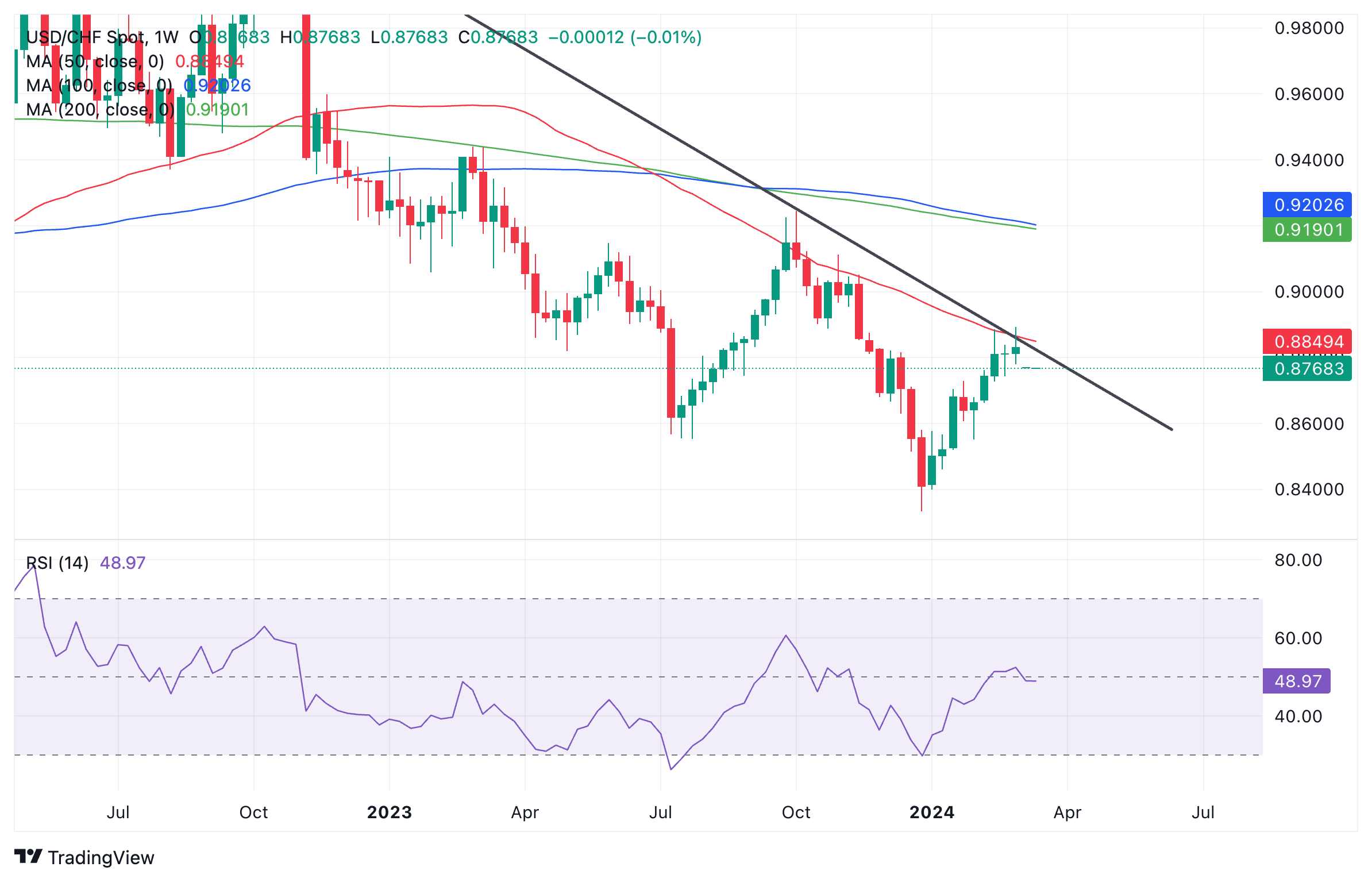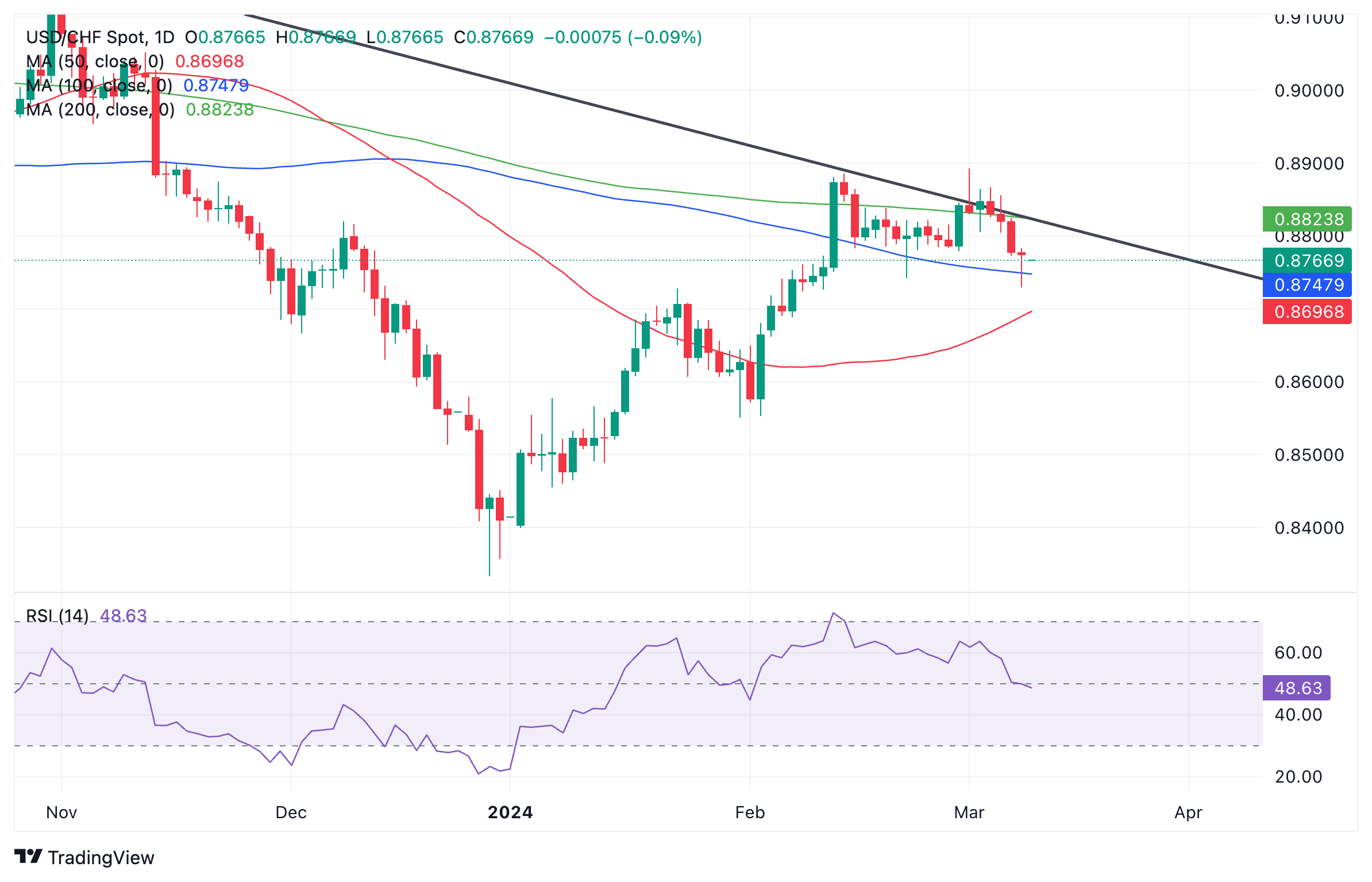- Analytics
- News and Tools
- Market News
- Swiss Franc edges higher as global equities turn red
Swiss Franc edges higher as global equities turn red
- The Swiss Franc edges higher as risk aversion sets in, hitting global stocks.
- The Swiss Franc is the go-to safe haven when investors become fearful.
- USD/CHF has turned lower after touching a key resistance level on the weekly charts.
The Swiss Franc (CHF) edges higher against the US Dollar (USD) on Monday as it capitalises on its safe-haven status. Global equity markets, a key barometer of risk appetite, are falling on uncertainty over the economic outlook, news of another China property bailout and over-valuation concerns. Most European equities are down by over half a percentage point and US futures are also deep in the red ahead of Wall Street's open.
Swiss Franc vulnerable, HSBC says
Swiss Franc upside could be limited, according to analysts at HSBC, who see the Swiss National Bank’s (SNB) reluctance to implement policies to strengthen the Franc as well as an environment of overall uptrending equity markets as key headwinds.
In an interview with Bloomberg in February, SNB Chairman Thomas Jordan said the Swiss Franc might now be too strong. The CHF, he said, had been rising in nominal terms for several years, and that this had been “helpful” as it had “shielded us from inflationary pressures from abroad.” Jordan added, however, that at the end of 2023 the Franc had started to rise in real terms, and that this could be a problem for Swiss businesses.
Recent lower-than-expected core inflation data in Switzerland, which fell to 1.1% in February – lower than the 1.2% previous – further suggests the SNB will not need to raise interest rates.
On the Horizon
The next key event for the USD/CHF is likely to be the US Consumer Price Index (CPI) data for February, published on Tuesday at 12:30 GMT.
The Consumer Price Index ex Food and Energy is forecast to moderate to 3.7% YoY – from 3.9% previously, and 0.3% MoM from 0.4% previously.
The headline CPI figure is forecast to come in at 3.1% YoY, unchanged from the previous month, and at 0.4% MoM from 0.3% in the previous month.
The result of the CPI data will be key in factoring into when the Federal Reserve (Fed) is expected to start cutting interest rates. A lower-than-expected result could lead to earlier rate cuts from the Fed, which would have a negative impact on USD as it reduces foreign capital inflows.
According to the CME FedWatch Tool, which calculates a market-based expectation of when the Fed will begin reducing its Fed Funds Rate, the probability of a first cut in March is 4%, in May 31.5%, and the chances of a cut by June are 73.8%.
Technical Analysis: Swiss Franc vs US Dollar turns lower after touching key resistance level
The USD/CHF – the number of Swiss Francs one US Dollar can buy – is bumping up against several key technical levels on the charts which could point to the start of a reversal back down in line with the long-term downtrend.
The weekly chart shows the price currently butting up against the falling trendline of a descending channel, as well as the key 50-week Simple Moving Average (SMA). It is possible this could mark the inflection point of a reversal where the pair starts moving down again within the falling channel.

US Dollar vs Swiss Franc: weekly chart
The daily chart shows the battle at the resistance levels highlighted above, in more detail. The pair has pulled back from the channel line and weekly MA. It has also pierced below the February 22 low of 0.8742 on an intraday basis, suggesting the possibility of a deeper decline to 0.8645. A break below that level would solidify a reversal in the short-term trend and a bearish bias. The next target down if 0.8645 is breached would be the support level at January 31 lows of 0.8551.

US Dollar vs Swiss Franc: daily chart
There is now a good chance that price has reversed its uptrend. However, there is still also a fairly strong possibility it could recover and resume its trend higher. A break above the 0.8892 high would indicate a continuation of the short-term uptrend to a possible target at 0.9056.
Swiss Franc FAQs
The Swiss Franc (CHF) is Switzerland’s official currency. It is among the top ten most traded currencies globally, reaching volumes that well exceed the size of the Swiss economy. Its value is determined by the broad market sentiment, the country’s economic health or action taken by the Swiss National Bank (SNB), among other factors. Between 2011 and 2015, the Swiss Franc was pegged to the Euro (EUR). The peg was abruptly removed, resulting in a more than 20% increase in the Franc’s value, causing a turmoil in markets. Even though the peg isn’t in force anymore, CHF fortunes tend to be highly correlated with the Euro ones due to the high dependency of the Swiss economy on the neighboring Eurozone.
The Swiss Franc (CHF) is considered a safe-haven asset, or a currency that investors tend to buy in times of market stress. This is due to the perceived status of Switzerland in the world: a stable economy, a strong export sector, big central bank reserves or a longstanding political stance towards neutrality in global conflicts make the country’s currency a good choice for investors fleeing from risks. Turbulent times are likely to strengthen CHF value against other currencies that are seen as more risky to invest in.
The Swiss National Bank (SNB) meets four times a year – once every quarter, less than other major central banks – to decide on monetary policy. The bank aims for an annual inflation rate of less than 2%. When inflation is above target or forecasted to be above target in the foreseeable future, the bank will attempt to tame price growth by raising its policy rate. Higher interest rates are generally positive for the Swiss Franc (CHF) as they lead to higher yields, making the country a more attractive place for investors. On the contrary, lower interest rates tend to weaken CHF.
Macroeconomic data releases in Switzerland are key to assessing the state of the economy and can impact the Swiss Franc’s (CHF) valuation. The Swiss economy is broadly stable, but any sudden change in economic growth, inflation, current account or the central bank’s currency reserves have the potential to trigger moves in CHF. Generally, high economic growth, low unemployment and high confidence are good for CHF. Conversely, if economic data points to weakening momentum, CHF is likely to depreciate.
As a small and open economy, Switzerland is heavily dependent on the health of the neighboring Eurozone economies. The broader European Union is Switzerland’s main economic partner and a key political ally, so macroeconomic and monetary policy stability in the Eurozone is essential for Switzerland and, thus, for the Swiss Franc (CHF). With such dependency, some models suggest that the correlation between the fortunes of the Euro (EUR) and the CHF is more than 90%, or close to perfect.
© 2000-2026. All rights reserved.
This site is managed by Teletrade D.J. LLC 2351 LLC 2022 (Euro House, Richmond Hill Road, Kingstown, VC0100, St. Vincent and the Grenadines).
The information on this website is for informational purposes only and does not constitute any investment advice.
The company does not serve or provide services to customers who are residents of the US, Canada, Iran, The Democratic People's Republic of Korea, Yemen and FATF blacklisted countries.
Making transactions on financial markets with marginal financial instruments opens up wide possibilities and allows investors who are willing to take risks to earn high profits, carrying a potentially high risk of losses at the same time. Therefore you should responsibly approach the issue of choosing the appropriate investment strategy, taking the available resources into account, before starting trading.
Use of the information: full or partial use of materials from this website must always be referenced to TeleTrade as the source of information. Use of the materials on the Internet must be accompanied by a hyperlink to teletrade.org. Automatic import of materials and information from this website is prohibited.
Please contact our PR department if you have any questions or need assistance at pr@teletrade.global.















